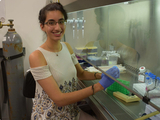Shirin will present her research at ABRCMS next month!
Shirin is a Biological Sciences major with minors in Spanish and Psychology, who will graduate in 2020. She is a member of the Honors College, and recently received a UMBC Travel Award to present her research at the Annual Biomedical Research Conference for Minority Students (ABRCMS), in Indiana this November.
Title of your research project: The Effect of Sleep Hormones on Cancer Cell Growth and Response to Chemotherapeutics
Describe your project: Our objectives are to determine if the diurnal addition of sleep hormones has an effect on cancer cell growth and response to chemotherapeutic drugs. We mocked the circadian rhythm of a cancer patient by putting specific physiological dosages of melatonin and cortisol in lung cancer cell lines and then tracking any change in cell growth that had occurred.
Who is your mentor for your project? Why did you choose them? My mentor is Dr. Daniel Gioeli in the UVA Department of Microbiology, Immunology, and Cancer Biology. I participated in the UVA Summer Research Internship Program (SRIP) this past summer, and I ranked Cancer Biology as my top choice for my lab in the application, which is how I was assigned to Dr. Gioeli’s lab! When I met Dr. Gioeli for the first time, I was so grateful that I was assigned to him as my mentor because he was very kind, hardworking, and understanding, and I could tell he was going to push me to reach my full potential within only ten weeks.
How did you become interested in this project? I became interested in this project because I learned a lot about cancer in the Cellular Biology course that I took last Spring semester, and it was shocking to learn everything that affects cancer progression. I had never thought that sleep could be a large factor that contributes to one’s cancer therapeutic treatment, but after reading a lot of literature about the background of this project, I was so invested in continuing to learn more about the effect that sleep has on cancer cell growth.
What has been the hardest part about your research/what was the most unexpected thing about being a researcher? The hardest part has been failing at an experiment and realizing that the amount of times you fail is generally higher than the amount of times that you succeed. However, I also learned that the amount of times you fail will also lead to the amount of times you succeed based on if you learn from the mistakes you made, which is the most important part of the whole process.
What has been the most rewarding part? The most rewarding part was learning more about scientific topics from my mentor and peers in lab and expanding my network with people that I now have long-term connections with. I was able to push myself past my own limits, and I could not have done it without the encouragement of all of the people in my lab and program.
How will you disseminate your research? I will be presenting my research at the Annual Biomedical Research Conference for Minority Students (ABRCMS) in Indiana this November, and I also plan on presenting my research at Undergraduate Research and Creative Achievement Day (URCAD) here at UMBC.
What is your advice to other students about getting involved in research? Try to find a research lab that aligns with your interests but do not be afraid to try something new, so keep an open mind. And never give up – no matter how many tries it may take to get your experiment running or to see results!
What are your career goals? I plan to obtain an AM/PhD while continuing to do medical research.
[Originally posted on the Office of Undergraduate Research's group page]
Posted: October 30, 2018, 9:19 AM
